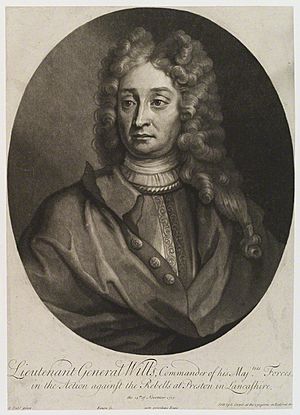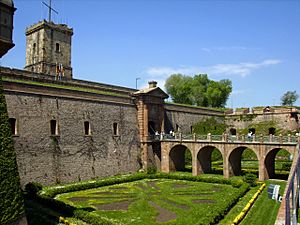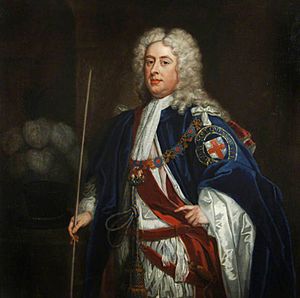Charles Wills facts for kids
Quick facts for kids
Sir
Charles Wills
|
|
|---|---|

Sir Charles Wills
|
|
| Member of Parliament for Totnes |
|
| In office December 1718 – December 1741 |
|
| Lieutenant-General of the Ordnance | |
| In office April 1718 – December 1741 † |
|
| Governor of Portsmouth | |
| In office 1718–1719 |
|
| Governor of Berwick-upon-Tweed | |
| In office 1715–1718 |
|
| Personal details | |
| Born |
Charles Wills
1666 St Goran, Cornwall |
| Died | 25 December 1741 (aged 75) London |
| Resting place | Westminster Abbey |
| Nationality | English |
| Political party | Whig |
| Occupation | Soldier and politician |
| Awards | Privy Councillor 1719 Order of the Bath 1725 |
| Military service | |
| Allegiance | |
| Years of service | 1689–1741 |
| Rank | General |
| Unit | Colonel, 30th Foot 1705–1716; Buffs, 1716–1725; Grenadier Guards 1726–1741 |
| Battles/wars | Williamite War in Ireland The Boyne; Aughrim Nine Years' War Landen Namur 1695 War of the Spanish Succession Cádiz; Guadeloupe; Barcelona; Cagliari; Almenar; Saragossa; Brihuega Jacobite rising of 1715 Preston |
General Sir Charles Wills (1666–1741) was an important British soldier and politician. He started his military career in 1689. He fought in several major wars, including the Williamite War in Ireland and the War of the Spanish Succession.
In 1715, he led government troops to victory at the Battle of Preston. This battle ended a rebellion known as the Jacobite rising of 1715. For his service, he was promoted to lieutenant-general.
Sir Charles Wills also served as a member of parliament for Totnes from 1718 until his death in 1741. He was a loyal supporter of the government. In 1719, he became a Privy Councillor, a special advisor to the King. King George I also made him one of the first members of the new Order of the Bath in 1725. He died in London on December 25, 1741, and was buried in Westminster Abbey.
About Charles Wills
Charles Wills was born in October 1666 in St. Goran, Cornwall. He was one of six sons born to Anthony Wills and his wife Jenofer. Charles became the most successful of his brothers.
He never married. When he died in 1741, he left most of his money to his friend, Sir Robert Rich.
Early Military Career (1689–1714)
Charles Wills began his army career in 1689. He joined the army that King William III was building. He fought in the Williamite War in Ireland from 1689 to 1691. He took part in battles like The Boyne and Aughrim. In 1691, he became a captain.
In 1692, his regiment moved to Flanders for the Nine Years' War. He fought in battles like Landen and the Siege of Namur. By 1697, he was a lieutenant-colonel. The war ended with the Treaty of Ryswick.
When the War of the Spanish Succession began in 1701, Wills joined a new regiment. In 1702, he went to Spain. He helped capture Port St Mary. He also joined an expedition to the West Indies. They landed on the French island of Guadeloupe in 1703. Many soldiers got sick there. Wills helped evacuate the remaining troops.

In 1705, Wills went back to Spain. He helped capture Barcelona on October 4, 1705. Soon after, he became a colonel. In 1706, he took command during a fight when his general was badly wounded. He also helped defend Barcelona when it was attacked again. He was promoted to brigadier-general in 1707.
Later in 1707, Wills was in charge of Allied forces in Catalonia. He led the defense of Lleida for two months. This stopped the enemy from attacking Barcelona. In 1708, he helped capture Cagliari in Sardinia.
He returned to Spain in late 1709 as a major-general. He won battles at Almenar and Saragossa. The Allied forces entered Madrid. However, they had to retreat. Wills and 3,500 British troops had to surrender at the Brihuega on December 8.
The war ended soon after. Wills was released after a few months. His regiment was sent to Ireland in 1714.
Later Career and Politics (1715–1741)
In 1714, Queen Anne died. Her successor was King George I, a Protestant. This was because of the Act of Settlement 1701, which said Catholics could not be king or queen. This led to a rebellion in 1715 by supporters of the Catholic heir, known as the Jacobite rising of 1715.
Wills was given command of government troops in Chester. On November 13, he attacked the rebels at Preston. The rebels surrendered the next day. This victory ended the rebellion.
Wills was promoted to lieutenant-general. He became Governor of Berwick-upon-Tweed from 1715 to 1718. Then he was Governor of Portsmouth from 1718 to 1719. These were important jobs. In 1718, he also became Lieutenant-General of the Ordnance. He held this position until he died.

In December 1718, Wills became a Member of Parliament for Totnes. This area was controlled by a powerful politician, the Duke of Bolton. Wills held this seat until his death. He became a Privy Councillor in May 1719. He always voted for the government.
In 1725, King George I made him one of the first members of the new Order of the Bath. In 1726, he became colonel of the Foot Guards. King George I was said to have planned to make him a peer (a lord), but the King died in 1727.
In 1737, Wills had a disagreement with King George II. Even so, he became a full general of the infantry in 1739. He died in London on December 25, 1741. He was buried in Westminster Abbey.
 | Delilah Pierce |
 | Gordon Parks |
 | Augusta Savage |
 | Charles Ethan Porter |

